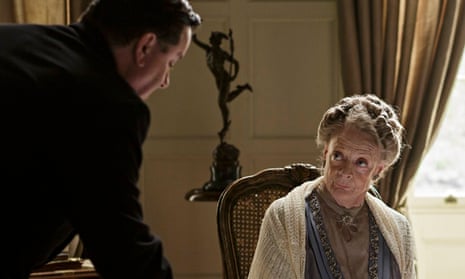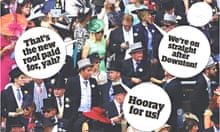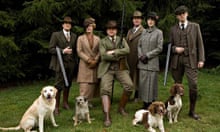Downton Abbey is back. Christmas day brings a two-hour wallow in heritage visions of our feudal yesteryear, as glimpsed through rose-tinted decanters. There will be snow and grouse shooting, we’re told. Escapist fantasy, National Trust nostalgia, here is history scrubbed clean – absurd, silly, enjoyable and vastly popular, in my family too. But it’s not harmless. Far from it.
To control history by rewriting the past subtly influences present attitudes too: every dictator knows that. Downton rewrites class division, rendering it anodyne, civilised and quaintly cosy. Those upstairs do nothing unspeakably horrible to their servants, while those downstairs are remarkably content with their lot. The brutality of servants’ lives is bleached out, the brutishness of upper-class attitudes, manners and behaviour to their servants ironed away. There are token glimpses of resentments between the classes, but the main characters are nice, in a nice world. The truth would be impossible without turning the Earl of Grantham and his family, the Crawleys, into villains, with the below-stairs denizens their wretched victims – a very different story, and not one Julian Fellowes would ever write.
Much attention is paid to detail. Place settings are measured to perfection with a ruler, the footmen’s buttons absolutely correct, yet everything important is absolutely wrong. Start with the labour: what we see is pleasant work by well-manicured maids in fetching uniforms, healthy and wholesome, doing a little feather-dusting of the chandeliers, some silver polishing, some eavesdropping while serving at table and some pleasant cooking with Mrs Patmore. There is even time for scullery maid Daisy to sit at the kitchen table improving herself with home education. In Downton the hierarchical bullying of servants by one another is replaced by the housekeeper and butler’s benevolent paternalism: what a nice place to work.
What we never see is bedraggled drudges rising in freezing shared attics at 5.30am; slopping out chamber pots, heaving coal, black-leading grates, hauling cans of hot water with hands already made raw by chilblains and caustic soda. We never dwell on the hardship of scrubbing floors, or scrubbing clothes, or scouring grease; in pre-detergent days, they were up to their elbows all day long. And yet they had virtually no water or time for washing themselves. Servants were often sooty and dirty. They smelled strongly of sweat, with few clean clothes, says Dr Lucy Delap, author of Knowing Their Place: Domestic Service in Twentieth-Century Britain. She says they used patchouli oil to cover the sweat, the identifying aromas of hard service. In Mrs Woolf and the Servants, Alison Light records Virginia Woolf observing “Mabel sweats when she is making jam”. Even the somewhat more enlightened and sometimes embarrassed Bloomsbury set wrote of their “inferiors”, Woolf talking of “that poor gaping imbecile, my charwoman”.
By comparison, Downton’s conservative aristocrats would have been far more abusive – verbally and actually: mocking, sneering and complaining about their servants was standard Edwardian and inter-war conversation. Instead we see the Crawleys’ deep concern for their staff’s welfare, compassionate when one is charged with murder and another revealed as jailed for jewellery theft. In life, they would have been turfed out without references at any whisper of scandal. Dr Delap records workhouses filled with maids who got pregnant, forever vulnerable to other predatory servants and tradesmen, often reduced to prostitution without a character reference to get another job.
Anachronism stalks every corridor of Downton, polishing up history to make the class divide less savage. The Crawleys’ prejudices and snobberies exposed in the raw would be as unbearable to the modern ear as if they were speaking in authentic 1920s accents. Then, as now, upward mobility is a necessary part of the myth, to hide the reality of class rigidity. So the Crawleys see their daughter marry their chauffeur, only for him to ascend upstairs with barely a ripple in the social fabric. Another Crawley daughter bears an illegitimate child, but is befriended by her starchy grandmother, the child accepted by his lordship who divines the truth with hardly a blench. Rose marries into a rich Jewish family, but only one absurd relative expresses the antisemitism that was so rife – and still is, in upper-class circles. Nor is crude snobbery dead yet: remember that Prince William dressed up for a chav fancy dress party, with an outfit to mock the vulgar lower orders. None of Downton’s social liberalism is remotely credible, but its creators needed to invent a steam-cleaned past.
There is a natural emotional wish to believe that social mobility is improving. People like rags-to-riches stories, wanting to think everyone has a fair chance to rise by merit and effort – even when it’s patently not so. Even those with little chance in life tend to blame themselves – “I should have tried harder at school” – not a social caste system that stacked the odds against them.
Modern capitalism promotes the myth that we are all masters of our fate and birth is not destiny, as proof that swelling wealth at the top has been earned. Downton doesn’t suggest Lord Grantham earned his status, only that the Crawleys’ generous-spirited noblesse oblige makes their role acceptable. History is important: it was funny when a plastic water bottle was left on Downton’s mantelpiece, but Downton’s plastic social history is misleading whitewash.
Does it matter? Isn’t it just a bit of fun? Well, what would we think of a prettified series about British colonialism, whose heroes were cleansed of racism, violence, oppression or imperial snobbery? The implanting of falsely comforting memories of a better bygone era disguises fundamental things about the way we live now.
As it is, there is still a widespread misperception of the nature of class and destiny. Inequality is rising on an ever upward trajectory, yet people are easily deceived by a veneer of modern classlessness: the end of deference and forelock-tugging makes class less obvious and more insidious, though every statistic shows how deeply entrenched it remains.





